How Safe Are Essential Oil Diffusers
Essential oil diffusers have become increasingly popular as a way to enjoy the benefits of essential oils in a convenient and effective manner. From promoting relaxation and mood enhancement to purifying the air and improving overall well-being, these devices offer a wide range of advantages. It’s important to understand the potential risks associated with their use, especially for children, pets, and individuals with certain medical conditions. In this article, we will explore how essential oil diffusers work, their benefits, safety considerations, recommended oils, and alternatives to diffusers. Let’s dive in and learn more about these aromatic devices.
Key Takeaways:
What Are Essential Oil Diffusers?
Essential oil diffusers are devices that disperse essential oils into the air, allowing for inhalation and potential therapeutic effects.
These devices serve as a popular way to enjoy the benefits of essential oils, which are extracted from plants and carry the natural essence and aroma of botanicals. By breaking down the oils into tiny molecules and dispersing them, diffusers create a fine mist that can be easily inhaled. Many people use essential oil diffusers to improve their mood, promote relaxation, alleviate stress, and even support respiratory health. The process of diffusion can also help purify the air and eliminate odors, making it a versatile tool for both wellness and ambiance.
How Do Essential Oil Diffusers Work?
Essential oil diffusers work by breaking down essential oils into small particles that are then released into the air when the diffuser is activated, allowing for inhalation.
Once the essential oil is placed into the diffuser, the device uses various methods such as ultrasonic vibrations or heat to disperse the oil molecules into the surrounding air. These tiny particles linger in the air and can be inhaled, providing a natural and aromatic experience that can have various health benefits.
Inhaling essential oils through diffusion can have soothing effects on the mind and body, promoting relaxation, reducing stress, and even improving focus and concentration. Different oils offer unique benefits, such as lavender for calming effects or eucalyptus for respiratory support. Using an essential oil diffuser is a popular way to enjoy these benefits in a convenient and efficient manner.
What Are the Benefits of Using Essential Oil Diffusers?
Using essential oil diffusers can provide various benefits such as aromatherapy for relaxation, promoting wellness, and offering potential therapeutic effects.
Essential oil diffusers work by dispersing the natural oils into the air, allowing you to breathe in the aromatic molecules. These molecules can positively impact your mood, reduce stress levels, and create a peaceful atmosphere in your home.
Different essential oils have specific properties that can help with headaches, congestion, insomnia, and more. By incorporating essential oil diffusers into your daily routine, you can enhance your mental and emotional well-being, improve sleep quality, and even boost your immune system. It’s a natural way to elevate your wellness and create a soothing ambiance in any space.
Aromatherapy
Aromatherapy through essential oil diffusers involves the inhalation of fragrant essential oils to promote relaxation and well-being.
When the essential oils are dispersed into the air, they release natural scents that can have a powerful impact on mood and emotions. The practice of aromatherapy is based on the idea that these fragrances can stimulate areas of the brain that are responsible for emotions and memories.
By inhaling these fragrances, individuals can experience a sense of calmness and stress relief. Many people use essential oil diffusers in their homes, offices, or even during yoga or meditation sessions to create a peaceful and tranquil environment.
Air Purification
Essential oil diffusers can aid in air purification by dispersing antimicrobial essential oils that may help cleanse the air in enclosed spaces.
These diffusers work by emitting micro-sized particles of essential oils into the air, which can help combat airborne bacteria and viruses. When inhaled, these oils can also have beneficial effects on one’s respiratory system. For instance, tea tree oil is known for its antimicrobial properties and can help eliminate pathogens in the air, while eucalyptus oil is great for clearing congestion and improving breathing. Using a diffuser regularly with such oils can create a healthier indoor environment by reducing the presence of harmful microbes.
Mood Enhancement
Using essential oil diffusers for mood enhancement involves diffusing specific oils known for their uplifting or calming effects to create a desired atmosphere of relaxation or positivity.
For instance,
- lavender oil is commonly used to promote relaxation and reduce stress,
- peppermint oil is known for its invigorating and energizing properties.
By dispersing these oils into the air through a diffuser, their aromatic compounds enter the body through inhalation, interacting with the brain’s limbic system to evoke emotional responses and influence mood. This method not only enhances the ambiance of a space but also provides a natural way to support emotional well-being and create a more tranquil environment.
Are Essential Oil Diffusers Safe to Use?
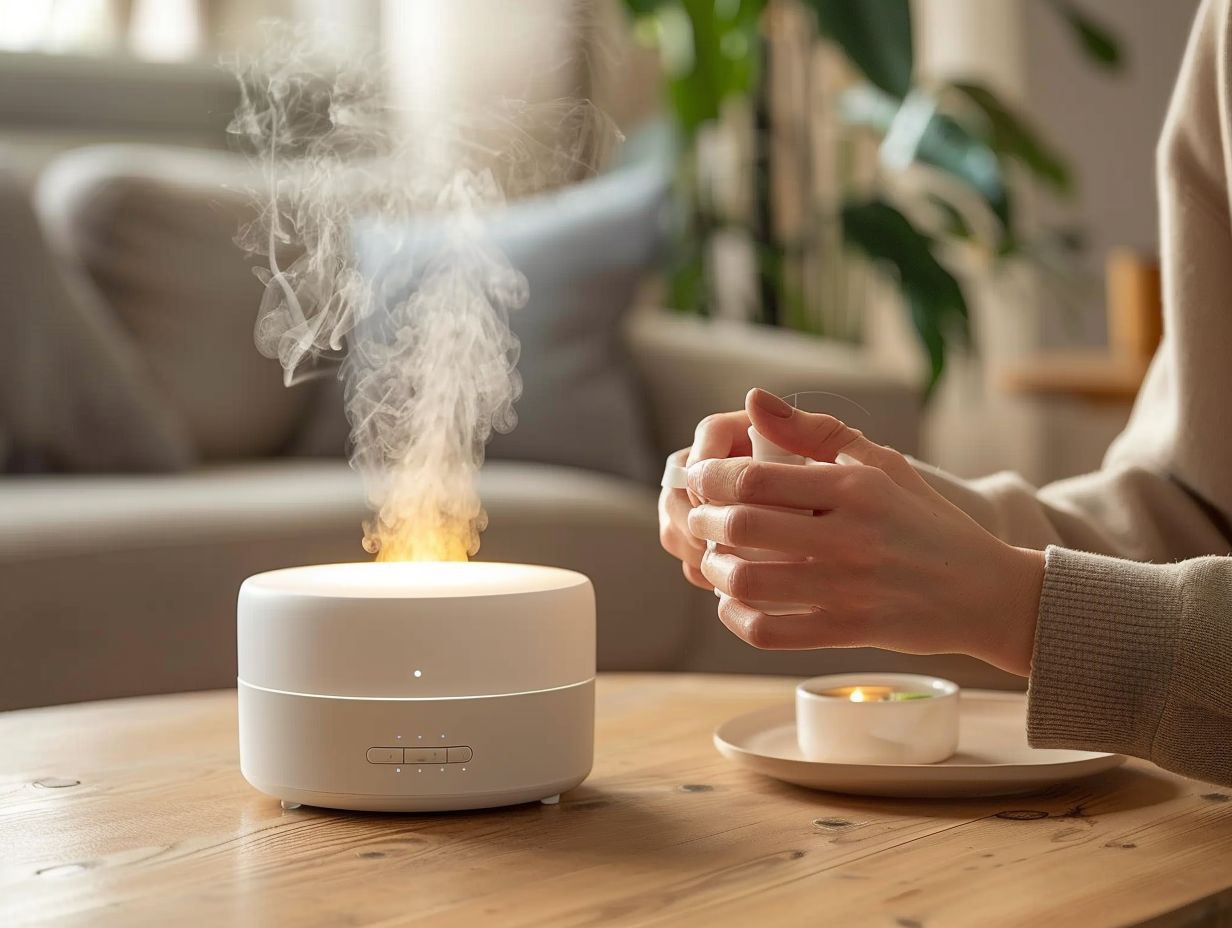
Essential oil diffusers are typically safe when used correctly, but there are some risks to be aware of.
For instance, certain essential oils can be harmful if ingested, leading to adverse reactions. If diffusers are not properly cleaned and maintained, they can harbor bacteria and mold, which may pose health risks. To learn more about essential oils diffuser sickness, click here.
People with respiratory issues should also exercise caution as some essential oils can trigger breathing difficulties. It is always advisable to consult with a healthcare professional before using essential oil diffusers, especially if you have any health concerns or uncertainties.
Potential Risks for Children
There are potential risks associated with children and essential oil diffusers, including the risk of allergies or adverse reactions due to their developing respiratory systems.
Children have more delicate respiratory systems compared to adults, making them more vulnerable to potential irritants and allergens in the air.
Exposure to certain essential oils, especially when diluted incorrectly or used in excess, can trigger allergic reactions such as skin rashes, itching, or even respiratory distress in children.
Some essential oils contain compounds that may be harmful when inhaled, potentially causing respiratory issues or exacerbating existing conditions like asthma.
Potential Risks for Pets
Pet owners should be cautious with essential oil diffusers around pets as certain oils can trigger reactions or discomfort, necessitating veterinary advice for pet safety.
While essential oils can offer benefits for humans, they may pose risks to pets due to their different physiology. Pets, especially cats and birds, are more susceptible to essential oils as they metabolize compounds differently. To learn more about the safety of Doterra essential oils, it is important to understand their potential effects on pets.
Some oils, such as tea tree, citrus, and peppermint, can be toxic to pets when inhaled or ingested. Symptoms of oil exposure in pets may include drooling, vomiting, difficulty breathing, or skin irritation.
It is crucial for pet owners to consult a veterinary professional before using essential oil diffusers to ensure the well-being of their furry friends.
Potential Risks for People with Certain Medical Conditions
Individuals with specific medical conditions such as asthma or respiratory issues should be cautious when using essential oil diffusers due to potential interactions and effects on their health.
For those with asthma, the strong scents emitted by essential oils can trigger respiratory distress, causing shortness of breath or even exacerbating asthma symptoms. Inhaling certain essential oils can also lead to airway irritation and inflammation, further complicating breathing issues. Individuals with pre-existing respiratory concerns may find themselves more sensitive to the concentrated aromas dispersed by diffusers, potentially leading to respiratory discomfort. It is crucial for those with medical conditions to consult with healthcare professionals before incorporating essential oil diffusers into their daily routine to ensure their safety and well-being.
What Types of Essential Oils Are Safe to Use in Diffusers?
Certain essential oils like lavender, peppermint, and eucalyptus are generally considered safe for use in diffusers due to their soothing and refreshing properties.
These essential oils have been popular choices for aromatherapy and home use due to their wide range of benefits.
- Lavender is known for its calming and relaxing effects, which can help reduce stress and promote better sleep.
- Peppermint is often used for its invigorating scent that can boost energy and focus.
- Eucalyptus is valued for its respiratory benefits, helping to clear congestion and improve breathing.
When used properly in diffusers, these oils can create a pleasant environment while potentially enhancing well-being. It’s essential to follow guidelines for dilution and duration of use to prevent any adverse reactions, especially for individuals with sensitivities or allergies.
Lavender
Lavender essential oil is widely used for relaxation and stress relief, but it can cause skin irritation in some individuals, necessitating a patch test before extensive use.
Known for its calming properties, lavender essential oil is extracted from lavender flowers through a process of steam distillation. Its aromatic scent is renowned for promoting relaxation and aiding in sleep. Plus its soothing effects on the mind and body, it can also help alleviate headaches and reduce anxiety levels.
When applied directly to the skin, there is a risk of potential irritation, especially for those with sensitive skin. Conducting a patch test by diluting the oil and applying a small amount to a small area of skin can help identify any adverse reactions before full-body application. This precaution is crucial to prevent unwanted skin reactions and ensure a safe and pleasant experience with lavender essential oil.
Peppermint
Peppermint essential oil is known for its invigorating scent and respiratory benefits, but individuals with allergies should use it cautiously to avoid adverse reactions.
Its refreshing qualities make it a popular choice for alleviating sinus congestion and promoting easy breathing. When diffused, peppermint oil can help clear the airways and provide relief during colds or allergies. Some people may be sensitive to peppermint oil and experience allergic reactions such as skin irritation or respiratory problems. It’s advisable to perform a patch test before topical application and consult a healthcare professional if you have known allergies.
Eucalyptus
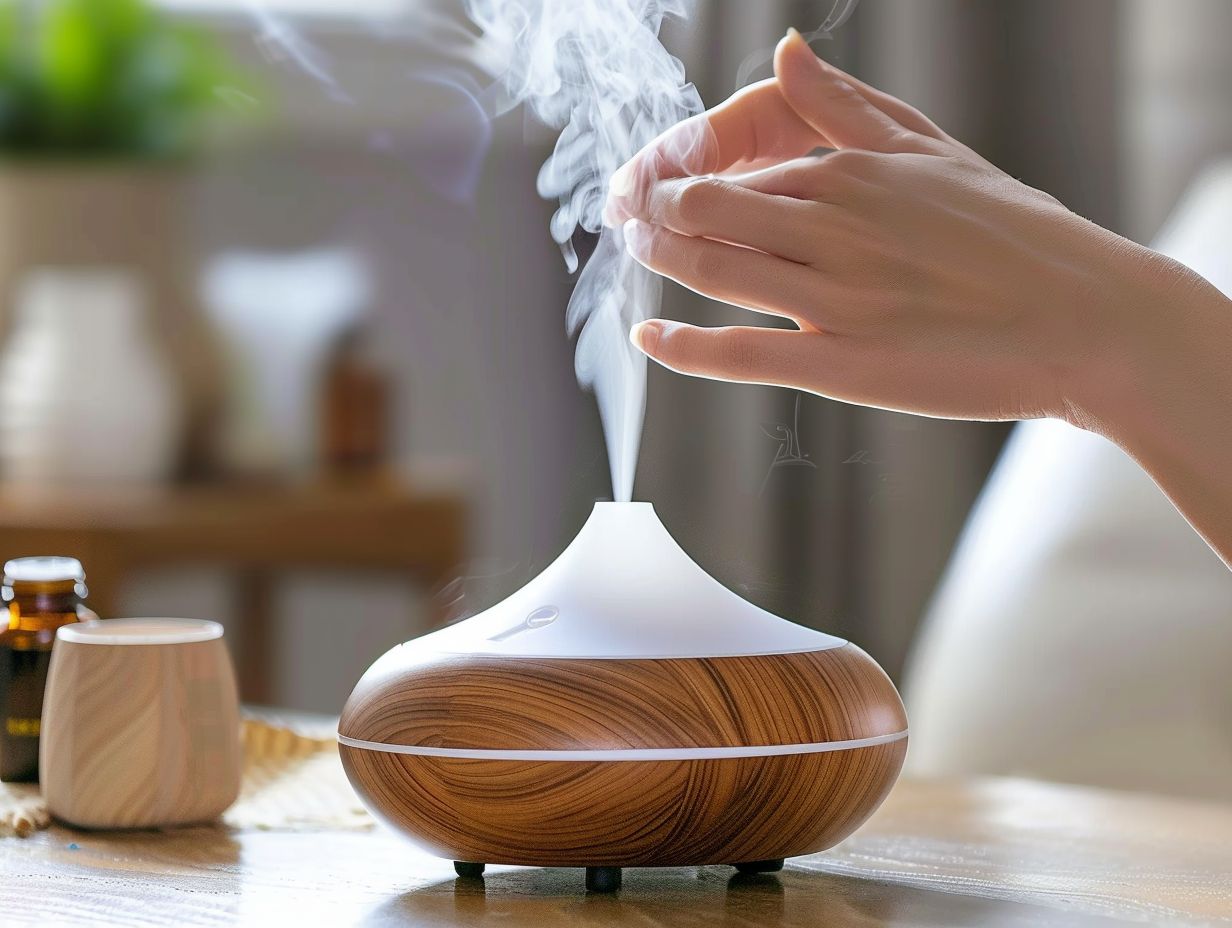
Eucalyptus essential oil is often used to clear the respiratory tract and promote easier breathing, but individuals with asthma should use it cautiously to prevent exacerbation of symptoms.
Eucalyptus essential oil contains compounds like eucalyptol that have decongestant properties, helping to loosen mucus and ease breathing. When inhaled, it can provide relief from nasal congestion and sinus pressure. The oil’s anti-inflammatory effects can also aid in reducing inflammation in the airways, making it easier for air to flow through. For those with asthma, it is essential to consult with a healthcare provider before using eucalyptus oil, as it may trigger asthma symptoms in some individuals.
How to Use Essential Oil Diffusers Safely?
To use essential oil diffusers safely, it is crucial to follow precautions such as proper dilution of oils, adherence to manufacturer’s instructions, and ensuring adequate ventilation in the space.
Proper dilution of essential oils is key to prevent skin irritation or allergic reactions. Always consult a reputable source for dilution ratios based on the type of oil and intended use.
Following the manufacturer’s instructions ensures the diffuser operates efficiently and safely. Each diffuser model may have specific guidelines for oil types, water levels, and operating times. Is using essential oils in a diffuser safe based on these instructions?
Ensuring adequate ventilation helps disperse the oil molecules effectively and prevents overpowering scents. Open windows or doors to promote air circulation in the room.
Dilute Essential Oils Properly
Properly diluting essential oils before use is essential to prevent skin irritation or allergic reactions, ensuring safe and effective diffusion in the air.
In terms of using essential oils, it’s crucial to understand the potential risks associated with improper dilution. Undiluted essential oils are highly concentrated and can be too potent for direct application, which may lead to skin irritation or sensitization.
By diluting essential oils with a carrier oil or other suitable base, you reduce the risk of adverse skin reactions, making them safer to use topically or in diffusers. This process not only helps to protect your skin but also ensures that the aroma is dispersed effectively without overwhelming your senses.
Use High-Quality Essential Oils
Choosing high-quality essential oils for diffusers is crucial to ensure therapeutic effects and minimize the risk of adverse reactions or negative effects on health.
In terms of selecting high-quality essential oils for your diffuser, it’s essential to consider the purity and source of the oils. Premium oils are derived from plants using careful extraction methods, retaining their therapeutic properties. These oils can have a profound impact on your well-being, whether you use them for relaxation, to boost your mood, or to alleviate various ailments.
By opting for top-quality oils, you reduce the chances of encountering synthetic additives or impurities that can cause skin irritations or trigger allergies. Additionally, essential oils of superior quality are often more potent, meaning you need to use less to achieve the desired effects, making them a cost-effective choice in the long run.
Follow Manufacturer’s Instructions
Adhering to the manufacturer’s instructions when using essential oil diffusers is crucial for safe and effective operation, optimizing the benefits of aromatherapy without adverse consequences.
Manufacturers provide these instructions based on extensive research and testing to ensure the diffuser’s proper functioning and your safety. Ignoring these guidelines can not only void the warranty but also lead to potential hazards.
Proper use of the diffuser according to the instructions can enhance the diffusion of essential oils, allowing you to fully enjoy their therapeutic effects and create the desired ambiance in your space. The instructions often include details on suitable oil types, water levels, and cleaning procedures to maintain the device’s longevity and efficiency.
What Are the Alternatives to Essential Oil Diffusers?
Apart from using essential oil diffusers, alternatives like topical application of oils or room sprays offer different methods of enjoying the benefits of essential oils.
Topical application of essential oils involves directly applying diluted oils onto the skin, allowing for quick absorption and targeted relief. This method is beneficial for targeting specific areas such as sore muscles or promoting skin health.
Room sprays, on the other hand, provide a quick way to infuse a space with the aroma of essential oils without the need for a diffuser. They are great for creating a pleasant ambiance, masking odors, and promoting relaxation in any room.
While diffusers disperse oils into the air for inhalation, topical application and room sprays offer more localized benefits and can be a convenient option for those who prefer not to use diffusers.
Topical Application
Topical application of essential oils involves directly applying diluted oils to the skin, but it is crucial to perform a patch test first to check for any adverse reactions.
A patch test is a simple method where a small amount of the diluted essential oil is applied to a small area of the skin, usually on the inner arm, to assess any possible irritation or allergic response.
This precaution is vital because essential oils are highly concentrated and potent, and their direct application without proper testing may lead to skin irritation, redness, or even more severe reactions.
Once the patch test is done and no adverse reactions occur, you can proceed to apply the diluted essential oils on larger areas of the skin for specific benefits.
Inhalation
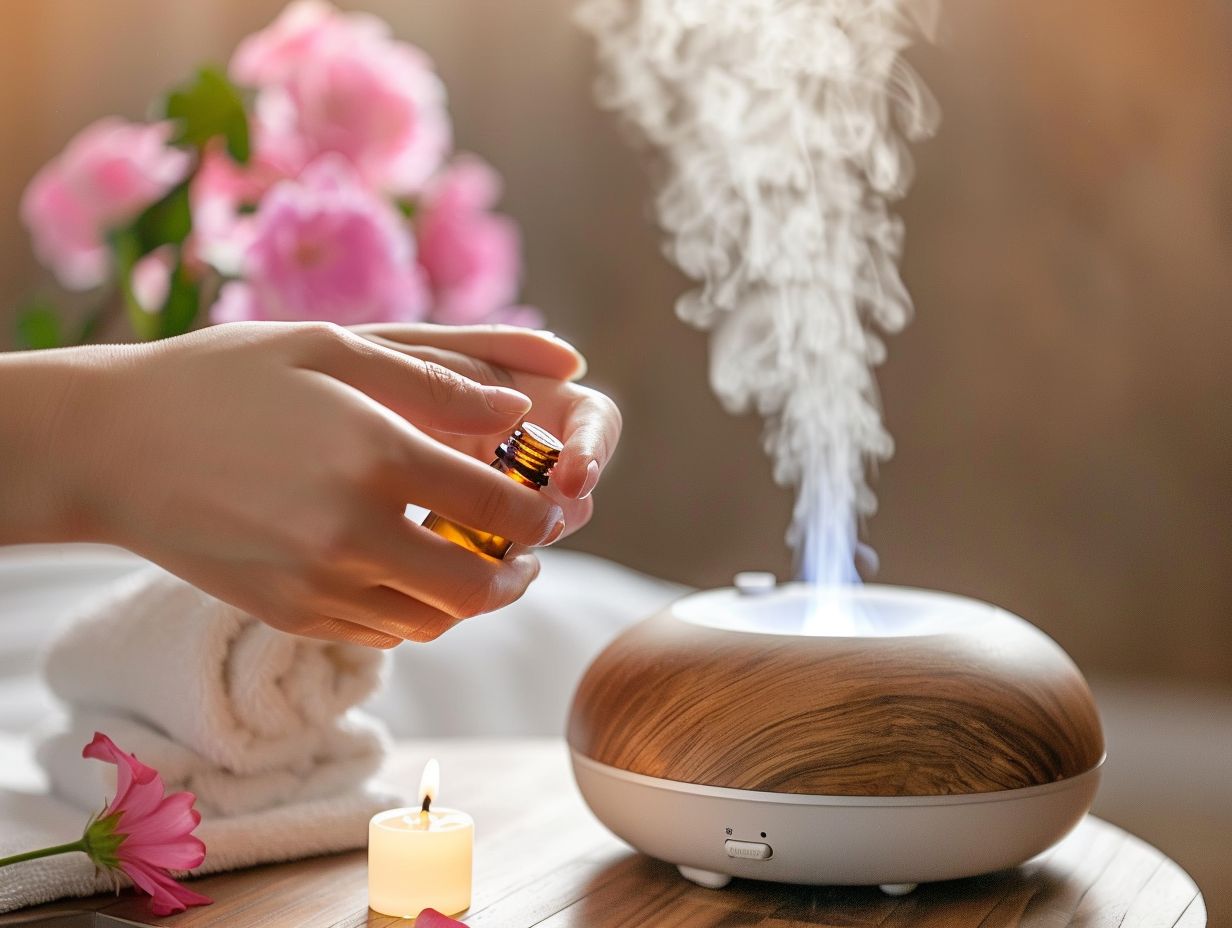
Diffusing essential oils into the air through aromatherapy devices can be an effective way to enjoy the benefits of inhalation. When inhaled, the molecules of the oils travel through the respiratory system and into the bloodstream, where they can have a positive impact on both physical and emotional well-being. The act of inhaling essential oils is believed to support respiratory health by clearing congestion, reducing inflammation, and promoting relaxation.
Room Sprays
Room sprays made from essential oils offer a convenient way to freshen up spaces with natural fragrances, but it’s important to be mindful of volatile organic compounds (VOCs) in some commercial sprays.
The given text is already wrapped in
tags, so no further formatting is required.
Frequently Asked Questions
How safe are essential oil diffusers?
Essential oil diffusers are generally considered safe to use, as long as they are used properly and in accordance with the manufacturer’s instructions.
Can essential oil diffusers cause harm?
In rare cases, essential oil diffusers may cause harm if they are used incorrectly or if the oils are not suitable for the individual’s health needs. It is important to always use high-quality oils and consult with a healthcare professional before use.
What are some potential risks of using essential oil diffusers?
Some potential risks of using essential oil diffusers include allergic reactions, skin irritation, and respiratory issues. It is important to always read and follow the safety precautions listed on the diffuser and essential oil bottles.
Are there any safety precautions to take when using essential oil diffusers?
Yes, there are a few safety precautions to keep in mind when using essential oil diffusers. These include using high-quality oils, diluting oils if necessary, avoiding diffusing oils around pets or small children, and using the diffuser in a well-ventilated area.
Can essential oil diffusers be left on overnight?
It is generally not recommended to leave essential oil diffusers on overnight, as prolonged exposure to the oils can cause respiratory issues. It is best to use the diffuser in short intervals and always monitor the room’s ventilation.
Are there any essential oils that are considered unsafe for use in diffusers?
Yes, there are certain essential oils that are not recommended for use in diffusers, such as wintergreen, camphor, and pennyroyal. It is important to always research and carefully choose essential oils for diffusing, especially if you have any underlying health conditions.

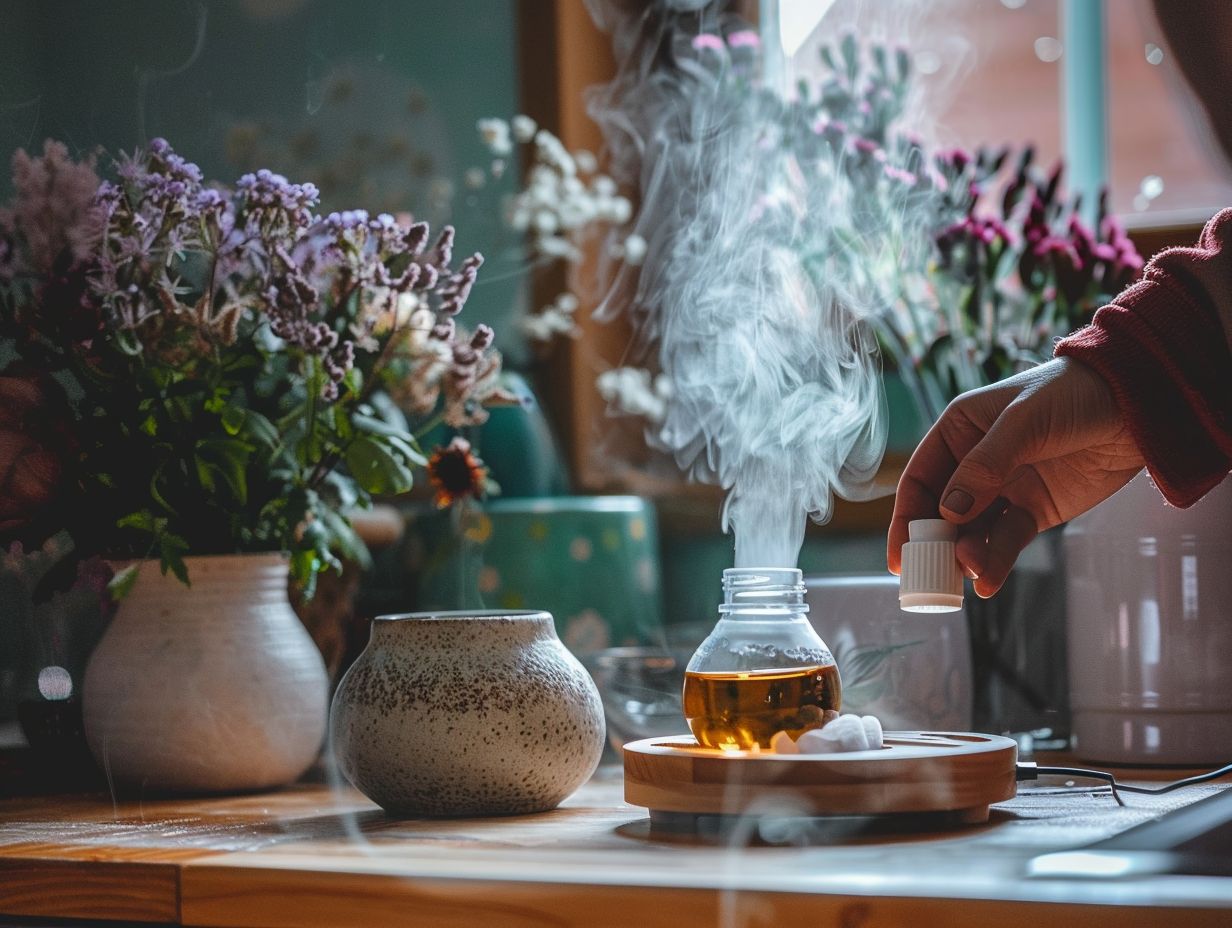
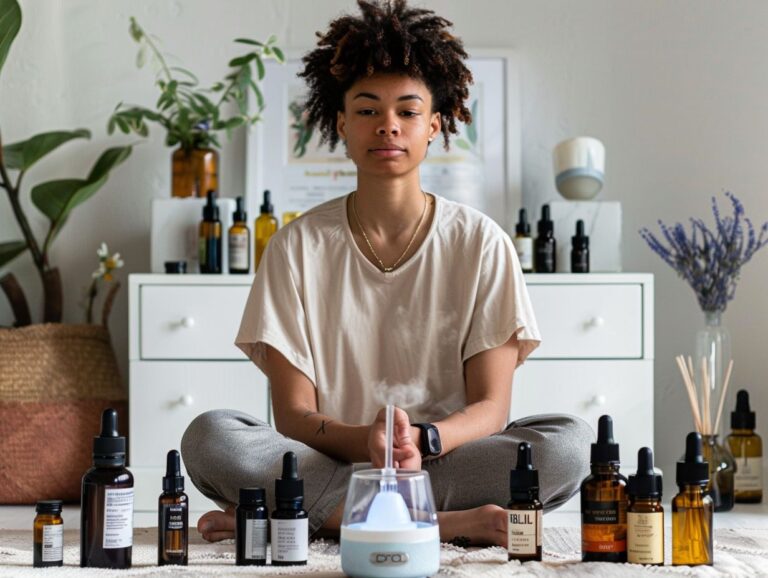





One Comment